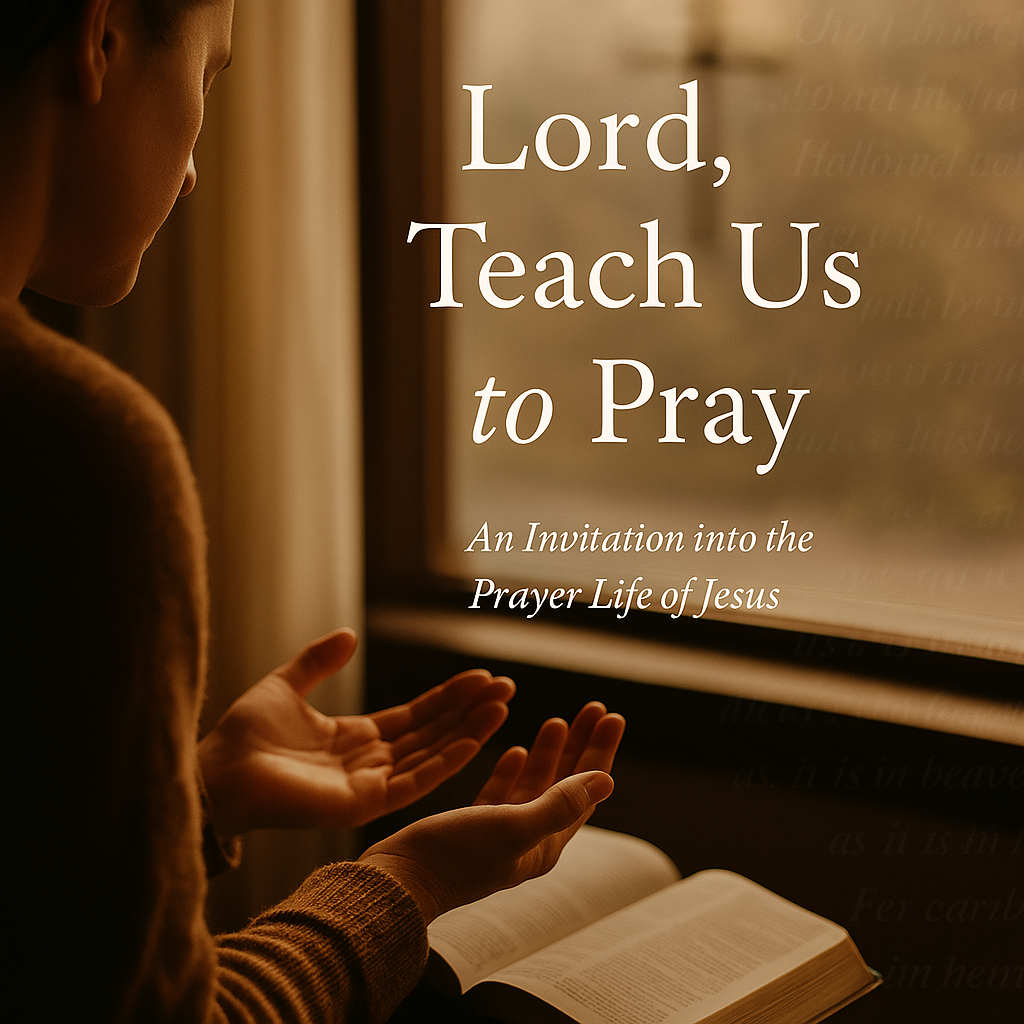Prayer
“Lord, Teach Us to Pray”
Rethinking Prayer Through the Words of Jesus
Luke 11:1 — “Lord, teach us to pray.”
Prayer is one of the most deeply human acts. It arises from places too deep for words—from joy, gratitude, longing, and anguish. Whether whispered in a hospital room, scribbled in a journal, sung in a cathedral, or uttered without sound, prayer is how we offer ourselves to God.
But how do we pray? Is there a right way? A model?
When Jesus’ disciples asked him this very question, he gave them what we now call The Lord’s Prayer. Far from a rote formula, it’s an invitation to learn how to live and breathe in communion with God. As New Testament scholar N.T. Wright puts it:
“The Lord’s Prayer is not so much a command as an invitation—an invitation to share in the prayer-life of Jesus himself… an invitation to know this God and to share his innermost life.”
Let’s walk through this prayer line by line, using the familiar King James Version, and reflect on what it teaches us about how to pray.
“Our Father which art in heaven”
The word “our” reminds us that prayer is never solitary. Every time we pray, we join a great chorus of voices across time and space.
“Father” means we are not crying out into a void. We are calling on the One who knows us, made us, and loves us. Jesus invites us to speak to God with the same intimacy he had with the Father.
Yes, the word Father can be painful for some—especially those who’ve known abuse or neglect. The Church must acknowledge this hurt. But we must also affirm that God is not a projection of flawed human parents. Rather, human fathers and mothers are meant to reflect the goodness of God. When Jesus called God “Father,” he gave us permission to approach God as one who is both tender and trustworthy.
“Hallowed be thy name”
To hallow God’s name is to recognize it as sacred. It’s a way of saying: “You are not common. You are not ordinary. You are holy.”
We begin with Father so we have the confidence to approach God. But we continue with hallowed so we don’t forget the weight of what we’re doing. We’re speaking with the One who spun galaxies into existence—and who is still attentive to our whispered prayers.
“Thy kingdom come, thy will be done in earth, as it is in heaven”
These words are a cry for liberation. We long for God’s justice, peace, mercy, and truth to flood the world—to undo oppression, end violence, and heal division.
We pray not only that God’s will would be done in the world, but also in us. These words ask God to reign over our priorities, our hearts, our habits.
“Give us this day our daily bread”
Simple. Ordinary. Necessary.
This line teaches us to depend on God moment by moment. We ask for physical provision—and spiritual nourishment. But it’s not just my daily bread. It’s our daily bread. We pray with and for others—the hungry, the addicted, the overwhelmed, the grieving.
“And forgive us our trespasses, as we forgive those who trespass against us”
We all need grace.
Forgiveness is at the heart of the gospel, but it’s not just about our relationship with God—it’s also about how we treat one another. We’re invited to live out a rhythm of grace: receiving and releasing, again and again.
Importantly, this line comes after our affirmation that we are loved and welcomed by the Father. Confession isn’t self-hatred—it’s a practice of realignment. God delights in us. He’s not sorry we exist. He made us with joy and intention.
“And lead us not into temptation, but deliver us from evil”
We live in a world where it’s easy to lose our way. These words are a prayer for guidance and protection. Evil is real, and Jesus taught us to name it. But he also taught us that God is stronger.
This line echoes the cry of God’s people in Egypt—“Deliver us!” And just as God set them free, we believe he will do it again. In our lives. In our world.
“For thine is the kingdom, and the power, and the glory, forever. Amen.”
Though not in the earliest manuscripts, this closing doxology became a natural expression of worship. It’s a way of saying: This is your world, God. Your story. Your power. Your glory. I trust you.
So, What Is Prayer?
Prayer is not about getting God’s attention. We already have it.
Prayer is about giving God our attention. It’s how we learn to live in relationship with him—bringing our thoughts, fears, hopes, and questions into the light of his presence.
We can pray with words or without. We can pray through writing, music, movement, silence, or art. Prayer is how we stay awake to God in a world full of distraction.
John Paul II once said that God made himself permanently available to us in Jesus and the Spirit. Prayer is our response: we become available to him.
And like breathing, prayer isn’t something we do perfectly. It’s something we do constantly.
Final Word
If you don’t know what to say, start with the words Jesus gave us. The Lord’s Prayer is more than tradition. It’s a lifeline. A compass. A reminder that God is near, and that we are never alone.
So today, maybe just pause—and pray:
“Lord, teach me to pray.”

